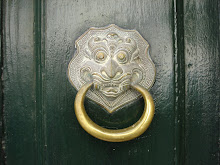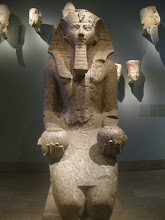
So I know the story behind the breathtaking view from the bathroom windows now.
I'm sitting on the 37th floor, in my little windowless office, listening to the opening of the 63rd General Assembly on streamed live on http://www.un.org/webcast/. The General Assembly is closed, but anyone can follow it via the UN webcast. I'm monitoring it for references to the UN Task Force on counter-terrorism. My supervisor needs to know which countries think what about the Task Force, to be able to know where to go next. She's away this week and too busy to monitor it herself.
I'm starting to feel a little more comfortable here, but I'm still intimidated by the vastness of this organization. And I'm not quite sure if this is a place I will want to come back to. Mainly because I feel a little bit like I'm just stacked away in some old room, not really important enough to be important, so to speak.
But anyway, the story behind the breathtaking view. Apparently, when the UN complex was first built, they never took into consideration that one day women would step out of their housewife shoes and enter into high politics. And when suddenly they did, there were no bathrooms for the ladies, and no place near the men's bathrooms to install them. So what they decided to do, was to take the only space available--right next to the elevators where those huge windows are. Yay for us!
Rumor has it that the men's bathrooms are just as windowless as my office.
In the words of a dreadlock-ed perfume seller on 42nd Street: Women smell sweet, men smell like feet. Or at least that's the way the UN must see things, or they could have rebuilt the men's bathrooms and put us there, and then built new bathrooms for the men over by the elevators.
I don't know, but I would have put the interns' office next to the elevators, and the bathrooms over here where the interns' room is.
Funny piece of UN history, in any event. Reminds us how long we've come on the path away from thinking that women are somehow not capable of doing things. Even so, everybody who knows me is aware of the fact that I'm in no way a feminist. I get annoyed with women in the West who somewhere along the line decided to blame everything that's wrong in their lives on men, and who find sexism in every other glance, sentence or photograph. Really, what most of the so-called feminists are doing is contributing to the stupidest idea in the history of gender thinking: that women are passive victims in A Man's World. We're not. We hold our destiny in our own hands, and if something's wrong in your life, chances are it's your own fault.
Don't get me wrong. I'm very much aware of the fact that I owe a lot of my freedoms to women who went before me and tore down walls and cast off aprons and demanded to be taken seriously. They're the ones who saw to it that the UN Headquarters has ladies' bathrooms in the first place, and I'm forever grateful to them for being able to pee sitting down during my time here.
But I would still never call myself a feminist. If you tell me that we are equal no matter what our chromosomes look like, I agree with you. If you tell me that we are treated differently based on our gender, I agree with that too. But if you say that men always have the upper hand, you just fail to see that there are disadvantages to being a man in this world too, just as there are advantages to being a woman.
Take trust, for instance. As a woman, I feel people trust me in just about every situation I can imagine myself being in. Even looking for short-term apartments or rooms here in New York, almost every other ad stated that they prefer females renting their place, and the only reason I can think of is that women are commonly viewed as more trustworthy than men.
Oh, speaking of which, I got the keys to the apartment I'm moving into next weekend. It's a room in an apartment up on Columbus Avenue. But I'll tell you more about that once I'm there.
Anyway, men frequently find themselves in situations where they are not trusted. Or so I imagine. Last winter, one of my neighbors who rarely comes out to his summer house stopped to pick me up as I walked home one late, snowy, cold afternoon, and the first thing he feels he needs to say after he asked me if I wanted a ride, is that he understands if I don't want to get into the car, since he could be a rapist for all I know. I'm not sure, but I would imagine that having every other person see you as a potential rapist, isn't an all too pleasant way of being viewed by your fellow human beings.
Because, really, that's what it all comes down to: we're all human beings, and if there's anything we should be working on is to make sure that no matter who you are, or what you look like, the least you should be able to expect from everybody else, is respect. Not because you're a woman, or because you're a man, but because you are here.
That having been said, I had a realization this summer. I never felt that my sex ever put obstacles in my way until this summer. In fact, after I came back from living in Egypt, I made a point of telling people who asked me if it wasn't difficult being a woman in the Middle East, that the way we happen to view women's rights is largely decided by our culture. Most of us don't feel held back by being expected to cover most of our torso, a large part of our legs in most situations, and a good part of our arms. In fact, we think of it as quite natural to wear a pair of pants or a skirt, and a top or a shirt in most situations (unless we're on the beach, when we're allowed to wear our underwear). But other cultures, who don't cover half as much as we do (if anything at all) could very well view us as being held back by our society's expectations by having to cover so much of our bodies in order to be viewed as decent.
I asked them to think of that, before they made judgements about the hejab, or the head scarf. My experience was that it was really quite a natural part of the dress in Egypt, and that those who chose to wear it, did so not to limit themselves, or to allow others to limit them, but because it is a part of their culture.
But this summer. In my little village on the northernmost tip of the West Bank, that I shared with approximately 3 500 Palestinian children, women and men, hundreds of sheep, quite a few donkeys and a few cows and horses, I had a different experience indeed. Most were very respectful of me (except that donkey that would stand outside my door refusing to budge, so that I had to press against the wall to get past it, while nervously observing its every move for any sign that it would kick or bite me... which it never did, but still). Most two-legged beings respected me and recognized that I had compromised and adjusted my clothing out of respect for their culture and wore considerably more clothes than I would have done in Sweden, had it been 45 degrees Celsius. But then there were some, two to be exact, that complained that I needed to change my clothes to respect Islam now that I lived with Muslims. And in a house in a nearby village where I was invited for lunch one day, I was seated in one room together with the wife because I was a woman, while my colleagues sat in another room just because they were men. Women and men have separate wedding parties, too, which never really made sense to me either, even if we have separate pre-wedding parties where I come from as well (but that also never made sense to me).
But all of this, together with the fact that women get married at 19 or 20 or 21 and have three kids by the age of 25 that they take care of, besides doing all the cooking and the cleaning and the washing, really started making me think about how much I owe to the women who went before me and paved the roads, knocked holes in the glass roof, and bulldozed down walls so that their daughters, and their children's daughters, can have the opportunity to choose for themselves what they want to do with their lives (given that all other non-gender obstacles are overcome).
Really, I know I'm lucky.
But if I didn't have those women go before me in my little village in Palestine, I had Mahmoud Abbas walk beside me. Mahmoud Abbas as in Abu Ahmed, not Abu Mazen (which would have been cooler for the sake of this story, I admit, but don't underestimate Abu Ahmed). And he let those two guys who complained about my clothes know that if anything, they were the one disrespecting Islam by not respecting their fellow human being (i. e. me), and if they ever brought this up again, he would... well, I'm not sure what he said, but those two guys never commented on my clothes ever again. But the point is that even this summer, what it really came down to was not gender at all. It's about human beings respecting each other. Abu Ahmed respected me, and he made it clear that those who didn't, did not live by the cultural rules of their society. Regardless of their sex.
If I see that perfume selling rastafarian ever again, I'll tell him he got it wrong. It's really supposed to be: Some smell sweet, some smell like feet.


















No comments:
Post a Comment